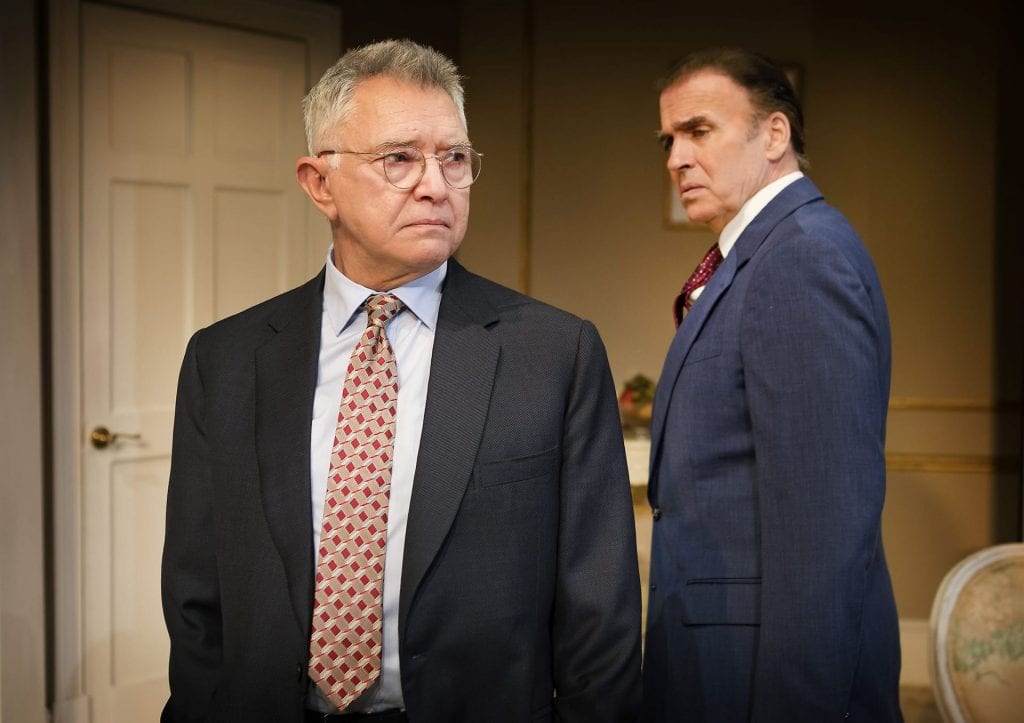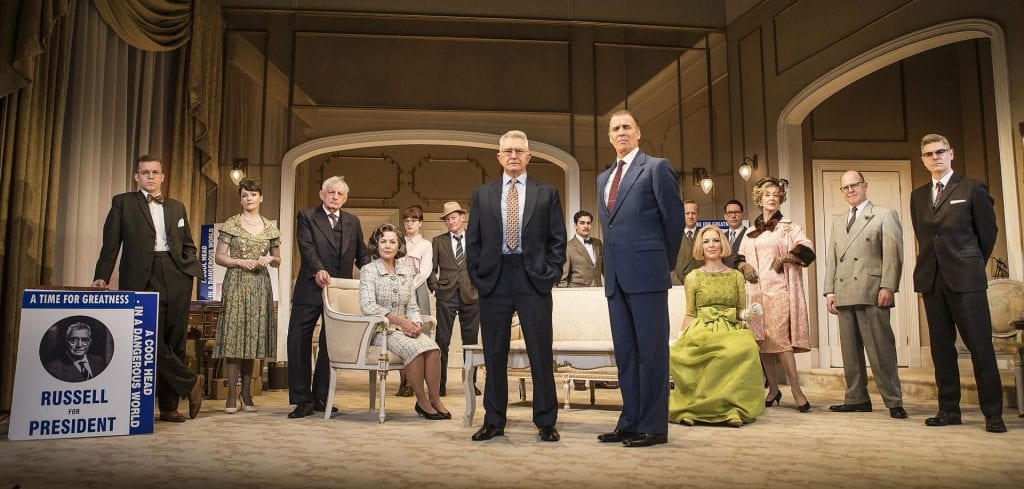by Dr Finn Pollard
The Best Man in the West End, or, What Makes A Good American President?
Plenty of theatre makers in recent times have sought to reflect on the election of Donald Trump. This revival (which I caught at the Playhouse Theatre in London in late March) of Gore Vidal’s 1960 play about a US presidential nomination struggle never mentions him. It doesn’t need to. On a number of astonishing occasions, it is as if Vidal possessed a time machine, so clearly might he be describing the current incumbent.
Vidal’s play tracks a nomination fight in an unnamed party (though at the time it was clearly based on the Democrats), taking place in Philadelphia – the location oddly felt like an anticipation of John Adams’s jibes about the place in 1969’s 1776 the musical. Cerebral, apparently moral, Secretary of State William “Hustle for” Russell faces off against southern Senator Joseph Cantwell. As the programme note points out, Vidal is too good a writer to make this a simplistic struggle between good and evil – though his sympathies do lie more with Russell. The play entertains the question of whether the thoughtful, moral Russell could cope with the decision making pressures of the role. It is very clear that Russell has been far from the best of husbands. There is a touch of arrogance to his conviction that he knows best about the issues. And when it brings down the presidency to the question of who can remain cool in a crisis (one of the most telling moments with respect to the present incumbant) it is by no means certain that Russell would be better.

The play is enjoyably steeped in the history of the office, and presidential nuts will have fun spotting references – my particular favourite was a throwaway joke about speech-writing for Harold Stassen (perennial GOP presidential candidate between 1944 and 1992). The incumbent, Art Hockstader (surely the echo of historian Richard Hofstadter was intentional) was apparently partly written as a send up of Truman, but in this production seemed to me to have strong echoes of Andrew Jackson.
Performance wise the evening takes a little while to get going. Several performers could work on projection – the words really matter in this show, and in the Grand Circle I sometimes had to strain to catch them. I also felt that all three male leads – Martin Shaw’s Russell, Jeff Fahey’s Cantwell and Jack Shepherd’s Hockstader just slightly lacked a needed charisma. For the play to really punch home when alone on stage each needs to absolutely hold the eye, when together the tussle asks for an electric tension. The trio find more of this after the interval, but when Cantwell and Russell finally come face to face I still felt the atmosphere could have been further heightened.
Michael Taylor’s staging feels a little too open, and Simon Evans’s direction a little too busy. Okay both candidates are in hotel suites, but these could have done with more sense of enclosure, entrapment. Evans and his performers don’t quite find that sense of the total character – that is when a revelation comes which you realise one character has known since they came on stage, I was not always convinced that that character had known it. An under current in the narrative is the possibility of the survival, perhaps even a truer reconnection, in the Russells marriage. There are some nice little moments, a repeated hand touching a shoulder, and a fine understated performance from Glynis Barber as Alice Russell but again I thought direction and performances could have found more in this.

But, ultimately, the richness of Vidal’s play still speaks. And it speaks because, as it turns out, the questions he was asking about what makes a good US president are as relevant in 2018 as they were in 1960. And this raises a further question – why is this production the play’s UK premier? And is there a relationship between that, and the fact that the performance I attended was poorly sold – though granted it was a Monday night. The reviews were perfectly decent. In theory, the British public are supposed to be interested in matters American at present. That the play is a slow burner, that the ensemble and production could I think be bettered might both account for it. But I wonder about two things. Firstly, this is a play of debate, of ambiguity (in that regard it reminded me a little of George Bernard Shaw’s plays which seem to have gone out of fashion in London again). Recent political plays of my experience tend to be plays that lecture. Are audiences not actually that willing to think? Secondly, it’s a play about American politics which assumes that processes and offices are matters of significance, the appropriate occupancy of and the struggle to occupy which we should discuss. Are British audiences less interested in the United States than we might think? Are such offices and struggles actually not considered significant? It was interesting to contrast the empty seats at this performance with the sold out rows at the National Theatre not long before for the adaptation of the film Network. Granted the latter had a star, Bryan Cranston, but it also had far less to say, asked much less of the audience, in relation to reflections on the current American political moment.
Afterwards, I found myself rather haunted by the experience of seeing Vidal’s play. Drafting this piece President Andrew Shepherd’s line from the film The American President came to mind: “being President of the United States is entirely about character.” Vidal’s play is, finally, ambiguous about what that character, or who that best man, should be. It does tell us something about how a man with the very worst of Senator Cantwell’s qualities could come to occupy the White House. And in its denouement, bound up with a nod to the way the presidency and its occupants have a tendency to become a canvass for projections of our hopes and fears, it offers a tiny glimmer of hope. That in politics we can still, sometimes, heed the better angels of our nature. How badly we need to be reminded.
